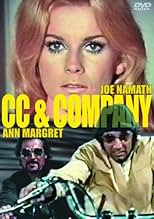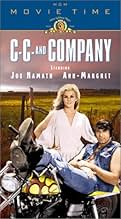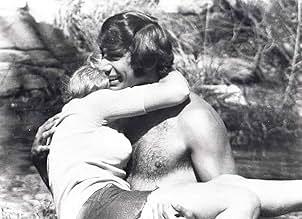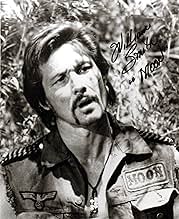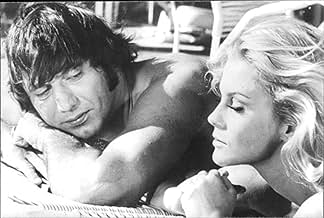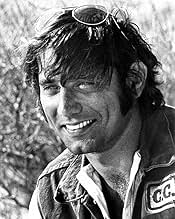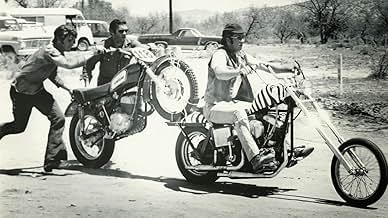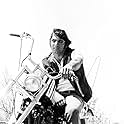IMDb RATING
4.8/10
1.1K
YOUR RATING
A motorcycle rebel saves a woman from his gang and fights an outlaw guru for supremacy.A motorcycle rebel saves a woman from his gang and fights an outlaw guru for supremacy.A motorcycle rebel saves a woman from his gang and fights an outlaw guru for supremacy.
Jacquie Rohr
- Zit-Zit
- (as Jackie Rohr)
Bill Baldwin
- Night Watchman
- (as William Baldwin)
- Director
- Writer
- All cast & crew
- Production, box office & more at IMDbPro
Featured reviews
Luscious Ann Margaret,her husband Roger Smith, an almost schoolboy-like "Broadway Joe", assorted character actors known for playing these kinds of roles, and a script that motorcycle enthusiasts either laugh like loons, or groan, at...or both.
Features some of the most priceless dialog this side of an Elvis epic. Some examples: "Those are the kind of people who give motorcycling a BAD name!", "Are you boys gonna help out a damsel in distress, or just make like Marlon Brando?", and more! Chicks and dudes - you will dig this! This love story/musical/60s stoner drive-in delight highlights incredibly stupid acts of riding AND crime (PLEASE don't try these anywhere!). All this, and Wayne Cochran (aka "The King of Blue-eyed Soul"), too. Makes a great double bill with either "Roustabout", "Easy Rider", "On Any Sunday", or NFL highlights of the Jets when Joe was their star QB. Good thing he stuck to sports after this mostly-intentionally forgotten effort. At least the bikes are cool, and the locations are stunning in that vivid color they used back then. Oh, and A-M gets a song in there, too...I think.
Features some of the most priceless dialog this side of an Elvis epic. Some examples: "Those are the kind of people who give motorcycling a BAD name!", "Are you boys gonna help out a damsel in distress, or just make like Marlon Brando?", and more! Chicks and dudes - you will dig this! This love story/musical/60s stoner drive-in delight highlights incredibly stupid acts of riding AND crime (PLEASE don't try these anywhere!). All this, and Wayne Cochran (aka "The King of Blue-eyed Soul"), too. Makes a great double bill with either "Roustabout", "Easy Rider", "On Any Sunday", or NFL highlights of the Jets when Joe was their star QB. Good thing he stuck to sports after this mostly-intentionally forgotten effort. At least the bikes are cool, and the locations are stunning in that vivid color they used back then. Oh, and A-M gets a song in there, too...I think.
While Joe Namath was likeable in his role, William Smith, who made a living mostly playing "bad guys" in many B pictures, gave the best performance in this movie. Smith looked like a biker, unlike Namath. He was nasty, grizzled, and mean. Just what you would expect from a "Hells Angel." With an R rating it would have been nice to see a little more skin (especially on a young Ann Margret) but the movie is worth seeing anyway.
Released in 1970, "C.C. & Company" is a low-budget biker flick starring none other than Joe Namath as C.C. Ryder, a quasi-member of The Heads motorcycle gang. When C.C. hooks up with a pretty fashion designer, played by Ann Margret, it causes friction with the other gang members, particularly Moon, played by William Smith. It all comes down to C.C. and Moon squaring off in a bike race at a high school football field track.
This is a fun biker flick and not as dead serious as 1966's "The Wild Angels" – the first and best biker flick – or 1969's popular "Easy Rider," which was just as good in its own way. "C.C. & Company" also seems to have a lower budget. For instance, there's some noticeably bad acting by Smith and Teda Bracci, the latter who plays biker chick Pig, but – then again – maybe they were intentionally shooting for camp (ya think!). The obvious draw here is Namath's larger-than-life charisma and cutie Margret; it's inexplicable that Namath didn't develop a lasting acting career (maybe that infamous pantyhose commercial did him in, lol). The rockin' late 60's soundtrack is also a treat. The whole cast obviously had fun making the film and it comes off on the screen.
Besides Margret, the movie features a couple other standout women, like Jennifer Billingsley as Pom Pom and Jacquie Rohr as Zit Zit. Billingsley is rather tall with model-like beauty, albeit hidden behind her wild biker chick garb, while Rohr is petite and curvy. The latter could've easily stolen the show if she had more screen time.
While worthwhile just for the two stars and amusing as light biker fare, "C.C. & Company" is unable to overcome its limitations, which explains my mediocre rating. Nevertheless, if you appreciate the biker genre that ran from 1966-1974 "C.C. & Company" is mandatory viewing, sort of.
The film runs 83 minutes and was shot in Tucson, Arizona, and Las Vegas.
GRADE: C
This is a fun biker flick and not as dead serious as 1966's "The Wild Angels" – the first and best biker flick – or 1969's popular "Easy Rider," which was just as good in its own way. "C.C. & Company" also seems to have a lower budget. For instance, there's some noticeably bad acting by Smith and Teda Bracci, the latter who plays biker chick Pig, but – then again – maybe they were intentionally shooting for camp (ya think!). The obvious draw here is Namath's larger-than-life charisma and cutie Margret; it's inexplicable that Namath didn't develop a lasting acting career (maybe that infamous pantyhose commercial did him in, lol). The rockin' late 60's soundtrack is also a treat. The whole cast obviously had fun making the film and it comes off on the screen.
Besides Margret, the movie features a couple other standout women, like Jennifer Billingsley as Pom Pom and Jacquie Rohr as Zit Zit. Billingsley is rather tall with model-like beauty, albeit hidden behind her wild biker chick garb, while Rohr is petite and curvy. The latter could've easily stolen the show if she had more screen time.
While worthwhile just for the two stars and amusing as light biker fare, "C.C. & Company" is unable to overcome its limitations, which explains my mediocre rating. Nevertheless, if you appreciate the biker genre that ran from 1966-1974 "C.C. & Company" is mandatory viewing, sort of.
The film runs 83 minutes and was shot in Tucson, Arizona, and Las Vegas.
GRADE: C
Attempting to parlay athletic success into movie stardom is fairly common. Namath is likeable, but his acting talent was nil. I saw this when it came out theatrically, and I also remember William Smith being a very nasty bad guy, and Ann Margaret's nude sex scene with Namath.
As producers, Allen Carr and Roger Smith didn't know how to make movies but they did know how to market them. "C.C. and Company" (1970) was one of Smith's attempts to revive the acting and singing career of his wife Ann-Margret, whose American career had pretty much dried up in the mid-60's. So they looked around for a way to package the aging star in a vehicle they could profitably distribute.
They decided to capitalize of the huge popularity of the super bowl champion N.Y. Jets quarterback Broadway Joe Namath. If you were not around in 1969 you will have a hard time grasping the extent of Joe's popularity. At its peak he was probably the most popular sports figure of all time and he single-handedly transformed NFL viewing from a men's club to a mixed gender group. In "C.C. and Company" Joe doesn't act so much as just play his relaxed good- natured self in front of the camera. The film begins with its best sequence as Joe, playing an outlaw motorcycle club member named C. C. Ryder, is shown walking around inside a supermarket while casually assembling a sandwich from the various products on the shelves. After he eats the sandwich he helps himself to a Twinkie and a small carton of milk. Then he hits the checkout line with just a package of "Fruit Stripe" gum to pay for and exits the store. This might be film's only attempt at symbolism as the gas tank and rear fender of Joe's chopper are painted a zebra stripe pattern. Baby boomers may recall that "Fruit Stripe" gum commercials featured a zebra.
Carr and Smith (Smith also wrote the screenplay) chose to make an independent outlaw motorcycle picture, a sub-genre dominated by American International. While AI's films were normally distributed to drive-ins, Carr and Smith hoped to exploit the recent unexpected success of "Easy Rider"- a motorcycle movie that had played well in mainstream theaters. And this is just what they did with "C.C. and Company", using Avco Embassy to book the film into first-run theaters and into giving it extensive promotion. It would not play to drive-in audiences until 1971.
Joe delivers a lot of charm, some credible action sequences, and a scene where he actually exhibits some acting skill (or at least an awareness of the acting craft). This scene occurs early in the film when his club disrupts a moto-cross race. Joe is sitting on his bike watching the fun when he spots Ann looking on in shock. Joe wordlessly conveys a sudden embarrassment over the actions of his associates. The scene works, in part because of good editing, but also because Namath obviously understands the process.
The film was not a success for Ann-Margaret even though she gets to ride a mini-bike in one scene and sing a song ("Today" by Lenny Stack). She was a bit too old to keep playing the innocent girl who is also a sex kitten role, up till then her standard character. Without this to fall back on she seems lost trying to appear more sophisticated. In the looks-sexy department she is totally upstaged by biker chick Pom Pom-Jennifer Billingsley who I remember as the Driving Range attendant on an episode of "Ozzie and Harriet".
Upstaging everybody is William Smith (who played Texas Ranger Joe on the "Laredo" television show) as "Heads" leader Moon. Flexing his muscles, thanks to a sleeveless denim jacket, Smith pretty much steals the whole film. The seemingly virile Moon is a disappointment in the sack, which sets up a little action between Namath and Billingsley. The big fight between Smith and Namath is nicely staged but is really sold by frequent cut-away shots to the increasingly turned-on Pom Pom.
Also notable is Sid Haig who rides a traffic cop trike and wears a Mongol helmet. Lizard, the other trike rider, is "Mary Hartman's" Greg Mullavy, whose machine sports a toilet seat and the title "The Heads Head".
Largely forgotten now, at the time of its release "C.C. and Company" was a cultural icon. It was probably the most quoted 1970 film in schools and workplaces. The most immortal line being Moon's convoluted declaration to C.C. that: "We got the club here see and you are way over there". And just about everything that straight-arrow moto-cross racer Eddie Ellis (Don Chastain) said was an instant classic. "That's what gives motorcycling a bad name" and "You talking to me" (he said the line before Robert De Niro!).
Then again, what do I know? I'm only a child.
They decided to capitalize of the huge popularity of the super bowl champion N.Y. Jets quarterback Broadway Joe Namath. If you were not around in 1969 you will have a hard time grasping the extent of Joe's popularity. At its peak he was probably the most popular sports figure of all time and he single-handedly transformed NFL viewing from a men's club to a mixed gender group. In "C.C. and Company" Joe doesn't act so much as just play his relaxed good- natured self in front of the camera. The film begins with its best sequence as Joe, playing an outlaw motorcycle club member named C. C. Ryder, is shown walking around inside a supermarket while casually assembling a sandwich from the various products on the shelves. After he eats the sandwich he helps himself to a Twinkie and a small carton of milk. Then he hits the checkout line with just a package of "Fruit Stripe" gum to pay for and exits the store. This might be film's only attempt at symbolism as the gas tank and rear fender of Joe's chopper are painted a zebra stripe pattern. Baby boomers may recall that "Fruit Stripe" gum commercials featured a zebra.
Carr and Smith (Smith also wrote the screenplay) chose to make an independent outlaw motorcycle picture, a sub-genre dominated by American International. While AI's films were normally distributed to drive-ins, Carr and Smith hoped to exploit the recent unexpected success of "Easy Rider"- a motorcycle movie that had played well in mainstream theaters. And this is just what they did with "C.C. and Company", using Avco Embassy to book the film into first-run theaters and into giving it extensive promotion. It would not play to drive-in audiences until 1971.
Joe delivers a lot of charm, some credible action sequences, and a scene where he actually exhibits some acting skill (or at least an awareness of the acting craft). This scene occurs early in the film when his club disrupts a moto-cross race. Joe is sitting on his bike watching the fun when he spots Ann looking on in shock. Joe wordlessly conveys a sudden embarrassment over the actions of his associates. The scene works, in part because of good editing, but also because Namath obviously understands the process.
The film was not a success for Ann-Margaret even though she gets to ride a mini-bike in one scene and sing a song ("Today" by Lenny Stack). She was a bit too old to keep playing the innocent girl who is also a sex kitten role, up till then her standard character. Without this to fall back on she seems lost trying to appear more sophisticated. In the looks-sexy department she is totally upstaged by biker chick Pom Pom-Jennifer Billingsley who I remember as the Driving Range attendant on an episode of "Ozzie and Harriet".
Upstaging everybody is William Smith (who played Texas Ranger Joe on the "Laredo" television show) as "Heads" leader Moon. Flexing his muscles, thanks to a sleeveless denim jacket, Smith pretty much steals the whole film. The seemingly virile Moon is a disappointment in the sack, which sets up a little action between Namath and Billingsley. The big fight between Smith and Namath is nicely staged but is really sold by frequent cut-away shots to the increasingly turned-on Pom Pom.
Also notable is Sid Haig who rides a traffic cop trike and wears a Mongol helmet. Lizard, the other trike rider, is "Mary Hartman's" Greg Mullavy, whose machine sports a toilet seat and the title "The Heads Head".
Largely forgotten now, at the time of its release "C.C. and Company" was a cultural icon. It was probably the most quoted 1970 film in schools and workplaces. The most immortal line being Moon's convoluted declaration to C.C. that: "We got the club here see and you are way over there". And just about everything that straight-arrow moto-cross racer Eddie Ellis (Don Chastain) said was an instant classic. "That's what gives motorcycling a bad name" and "You talking to me" (he said the line before Robert De Niro!).
Then again, what do I know? I'm only a child.
Did you know
- TriviaThe #12 given to Joe Namath ("CC") for the Moto X Race is the same number he wore on his jersey with the NY Jets.
- GoofsIn a scene where C.C. kicks starts his dirt bike you hear the engine rev-up but his hand never moves the throttle.
- Quotes
Ann McCalley: How do you get along without working?
C.C. Ryder: Just fine.
Ann McCalley: [laughs] You steal from the rich to give to the poor?
C.C. Ryder: No, I steal from the rich 'cause the poor have no money.
- ConnectionsFeatured in The Fabulous Allan Carr (2017)
- SoundtracksToday
The Love Theme from C.C. & Company (1970)
by Lenny Stack and Janelle Webb (as Janelle Cohen)
Sung by Ann-Margret
- How long is C.C. & Company?Powered by Alexa
Details
Contribute to this page
Suggest an edit or add missing content


